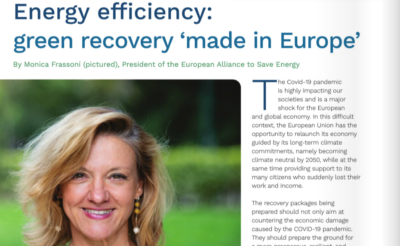
by Monica Frassoni, President of the European Alliance to Save Energy (EU-ASE)
This article featured in the summer 2020 edition of European Energy Innovation magazine
The Covid-19 pandemic is highly impacting our societies and is a major shock for the European and global economy. In this difficult context, the European Union has the opportunity to relaunch its economy guided by its long-term climate commitments, namely becoming climate neutral by 2050, while at the same time providing support to its many citizens who suddenly lost their work and income.
The recovery packages being prepared should not only aim at countering the economic damage caused by the COVID-19 pandemic. They should prepare the ground for a more prosperous, resilient, and sustainable future for our continent and the world.
Energy efficiency can help policymakers address the multiple challenges we are all faced with.
Energy efficiency is paramount for climate mitigation. Through existing technologies, it is possible to reduce energy consumption, increase the efficiency of the entire energy system and accelerate the integration of renewables. According to the International Energy Agency (IEA), 76% of the European greenhouse gas emission reductions required to keep temperature increases below 1.5°C must come from energy efficiency.
In the European Union, energy efficiency is one of the pillars of the European Green Deal. In the recent proposal of a European Climate Law, energy efficiency is part of the defining elements of the EU’s trajectory towards climate neutrality by 2050. Along the same lines, the current political focus on buildings renovations indicates that the EU institutions recognize the economic, social and environmental impact of a transition towards a highly efficient building stock. Last but not least, the European Commission recently highlighted in its EU Industrial Strategy that reducing emissions across industry, namely the most energy-intensive ones, will greatly depend on the wide implementation of efficiency measures and on the Energy Efficiency First principle.
When it comes to industrial strategy, economic growth and job creation, indeed, the full application of the Energy Efficiency First principle to all energy policymaking, planning and investments, can be a real change maker for the energy efficiency value chain and, as a consequence of this, for the European economy.
Our continent hosts some of the most innovative and successful energy efficiency companies in the world. The members of the European Alliance to Save Energy are global “champions” that export technologies and drive innovation. Hundreds of other players, especially SMEs, operate in this field across Europe.
